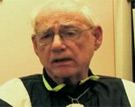Recently, we were able to achieve that pinnacle of foundation aspirations--cross-project synergy--when one of our grantees, The National Health Policy Forum at George Washington University, brought its audience of policymaking experts from the major federal agencies to visit another grantee, Guided Care at Johns Hopkins University.
 It was a timely visit. As health reform is writhing its way through Congress, policymakers are considering how to provide better care more efficiently--especially to the “frequent flying” chronically ill older adults that Guided Care was designed to serve. Yet it can be difficult to translate knowledge from researchers to a policymaker audience. That’s why the visit included the personal stories of three older adult beneficiaries and a family caregiver.
It was a timely visit. As health reform is writhing its way through Congress, policymakers are considering how to provide better care more efficiently--especially to the “frequent flying” chronically ill older adults that Guided Care was designed to serve. Yet it can be difficult to translate knowledge from researchers to a policymaker audience. That’s why the visit included the personal stories of three older adult beneficiaries and a family caregiver.
One of the beneficiaries, Mr. Altman, was the perfect spokesperson to fill the gap between the Guided Care experts and the policymakers. A WWII veteran of the army air force and subsequently an attorney and long-time member of office of the general counsel in the department of health and human services, Mr. Altman WAS a member of the policymaker audience with his personal clock dialed forty years forward. A powerful speaker despite his serious heart disease and recent bout of thyroid cancer, among other health concerns, he reminisced briefly about his work in the 1960s with the Social Security Administration at the time of the founding of Medicare.
 Mr. Altman described himself as cynical and skeptical of the benefit of many medical services, but, having experienced the Guided Care program, a true convert. Mr. Altman participated in the Guided Care trial at Johns Hopkins and continues to receive the services of a Guided Care nurse as part of routine care. He joked that he had the full collection of possible cardiac devices implanted in his chest, including a stent, a deliberator, and a pacemaker. He observed that while he had great confidence in the technical skills of all of his physicians and other health professionals, he felt that the Guided Care nurse was the only thing preventing him from wandering lost through the health system, both literally and metaphorically.
Mr. Altman described himself as cynical and skeptical of the benefit of many medical services, but, having experienced the Guided Care program, a true convert. Mr. Altman participated in the Guided Care trial at Johns Hopkins and continues to receive the services of a Guided Care nurse as part of routine care. He joked that he had the full collection of possible cardiac devices implanted in his chest, including a stent, a deliberator, and a pacemaker. He observed that while he had great confidence in the technical skills of all of his physicians and other health professionals, he felt that the Guided Care nurse was the only thing preventing him from wandering lost through the health system, both literally and metaphorically.
I was very struck by his vehement response to the question of how Guided Care had benefited him. While allowing that it had no doubt reduced the use of expensive services and facilitated efficient coordinated visits to his five specialty physicians, he argued that a vital and overlooked benefit was in reducing the anxiety that the health system so routinely provokes in patients. He described his alarm when one hospital physician proposed to discontinue his coumadin treatment without seeming to have had adequate consultation with his trusted cardiologist, who had prescribed it. Only the intervention of the Guided Care nurse, who arranged a brief call with his cardiologist, was sufficient to convince him that his physicians were truly collaborating. He also noted that the Guided Care nurse had quickly arrived at each of his hospitalizations bearing his written care guide to ensure that each hospital team knew his history and care plan.
In counterpoint, another speaker, a daughter-in-law caring for her husband’s 90-year-old mother while working as a flight attendant and mother to two middle-school-aged children, mourned the loss of their Guided Care services. Her mother-in-law was in the one practice unable to keep Guided Care when the externally funded trial was complete. The older woman was seen in an entirely fee-for-service practice, where the clinical benefits of Guided Care to patients were simply not a sufficient justification to add it to the costs of operating the practice. The fear and concern of the daughter-in-law with their return to usual care was clear to the audience. Later, the Guided Care nurse who had worked with the patient and family admitted that she had already answered several calls from the distraught daughter-in-law who had been unable to get critical questions answered in a timely way.
The Guided Care team is rapidly publishing its findings and preparing to deliver technical assistance to other practices preparing to provide medical home services to Medicare beneficiaries. (Although this is on hold until the Center for Medicare and Medicaid Services and the administration move forward with the Medicare Medical Home Demonstration.) It has collected rigorous evidence from the randomized clinical trial and examined the costs of its services and their cost savings across the rest of the health care continuum. Nonetheless, I’m sure that these personal stories, some of which are available on the Guided Care website, will be among the most important pieces of evidence. What do you think? Should testimonials, in addition to rigorous studies, be part of the “persuasion package” that we use to help gain support for important programs?
